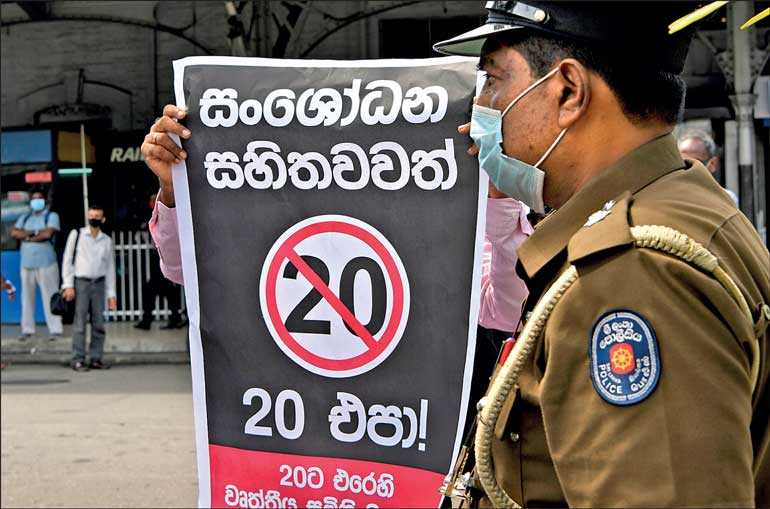Monday Feb 23, 2026
Monday Feb 23, 2026
Wednesday, 21 October 2020 00:07 - - {{hitsCtrl.values.hits}}

In many countries the people are afforded many opportunities to check whether the Legislature is doing what it should do and to see whether laws are consistent with the Constitution. In Sri Lanka, there is only a small window within which this can be done. What the amended 20th Amendment seeks to do is narrow that window even further. The Cabinet is still trying to get its way by playing word games – Pic by Shehan Gunasekara
The Cabinet wants us to believe that it has backed off from restricting the limited opportunity given to the public to challenge bills prior to approval. But it has retained a massive backdoor for bills related to “national security” and “disasters”. This must be closed.
Legislative power lies with the sovereign people. They are the Principal; Parliament is the agent. They allow their agents, the Parliament, to exercise it on their behalf.
But it is necessary for the people to exercise oversight on the actions of their agents. In many countries the people are afforded many opportunities to check whether the Legislature is doing what it should do and to see whether laws are consistent with the Constitution.
In Sri Lanka, there is only a small window within which this can be done. What the amended 20th Amendment seeks to do is narrow that window even further. The Cabinet is still trying to get its way by playing word games.
Renaming the backdoor
Since 2015, members of the public have had 14 days to study a proposed bill and get ready to challenge it before the Supreme Court. The much-abused urgent bills exception, wherein Cabinet could decide to designate any bill as urgent and bypass the process was removed in 2015. The 20th Amendment sought to reduce the 14 days to seven and reintroduce the urgent-bills exception.
Understandably, there was much opposition. Now, Cabinet has decided to retreat a little (or give the appearance of retreating). They will allow us 14 days to challenge the bills they do not choose to designate as related to “national security” and “disasters.”
In the old days, they unilaterally designated all sorts of routine bills as “urgent” and smuggled them through the backdoor. The only difference is that now all sorts of routine bills will be unilaterally designated by the Government as related to “national security” and to “disasters.” All that is being done is changing the name of the backdoor.
What’s the urgency?
The first curfew related to the present COVID-19 pandemic was declared seven months ago, on 20 March. The pandemic and the Government’s response to it have disrupted lives and livelihoods on a massive scale.
It has been repeatedly pointed out that the existing legislation is inadequate to deal with this pandemic. Many other countries have amended relevant legislation. But not Sri Lanka. We have managed without new legislation to deal with a phenomenon that most would agree falls within the definition of a disaster.
If a new law were to be drafted to legitimise Government actions taken with regard to the pandemic, it is almost certain to infringe on fundamental rights. Should the affected people, those who are the actual holders of legislative power, not have an opportunity to argue the pros and cons of the proposed law before the Supreme Court? Given the Government has ambled along for a good seven months doing nothing, what difference will a week or two make?
Forward, not backward
The 19th Amendment closed a gaping backdoor in the Constitution that allowed various governments to escape pre-enactment judicial review of legislation. The latest Cabinet decision simply renames the backdoor. It used to be called “urgent,” now it’s called “related to national security or disaster.” This should not pass.
What we need is post-enactment review; not the creation of backdoors and bypasses to pre-enactment review. We must move forward from the progressive changes introduced by the 19th Amendment, not go backward.